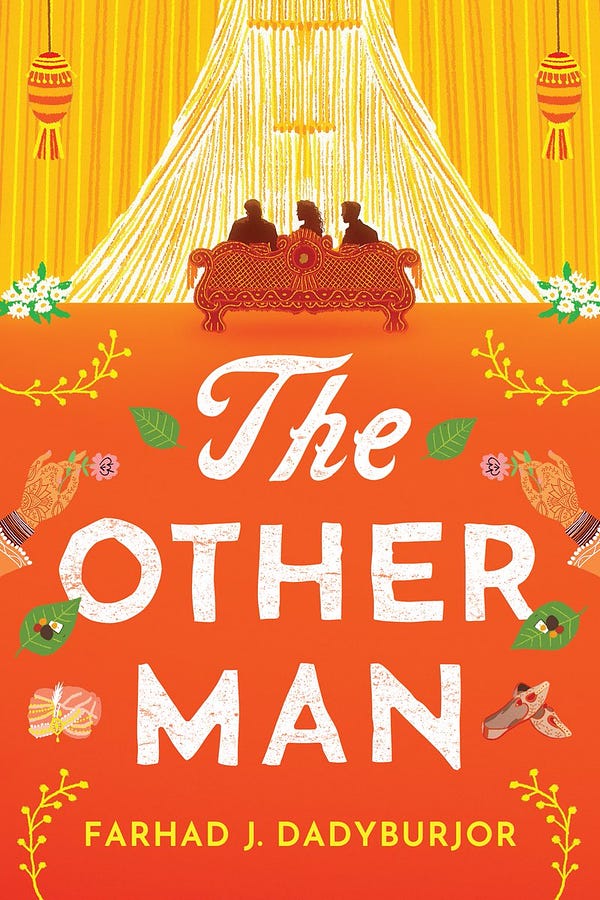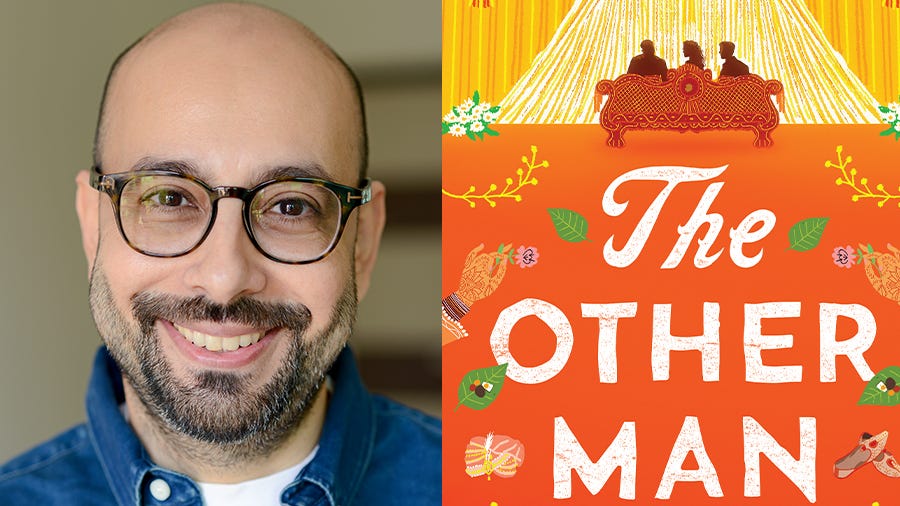How Farhad J. Dadyburjor Sits Down & Writes
'The Other Man' is the big-hearted gay romcom you need in your life.
Heir to his father’s Mumbai business empire, Ved Mehra has money, looks, and status. He is also living as a closeted gay man. Thirty-eight, lonely, still reeling from a breakup, and under pressure from his exasperated mother, Ved agrees to an arranged marriage. He regrettably now faces a doomed future with the perfectly lovely Disha Kapoor.
Then Ved’s world is turned upside down when he meets Carlos Silva, an American on a business trip in India.
As preparations for his wedding get into full swing, Ved finds himself drawn into a relationship he could never have imagined—and ready to take a bold step. Ved is ready to embrace who he is and declare his true feelings regardless of family expectations and staunch traditions. But with his engagement party just days away, and with so much at risk, Ved will have to fight for what he wants—if it’s not too late to get it.
The Other Man is perfect for fans of Call Me By Your Name by André Aciman and Boyfriend Material by Alexis Hall.
We chatted with Farhad about writing in silence, about love conquering all no matter what age, gender, nationality, or religion you are, and about exploring the issues that gay men in India face through the lens of a romantic comedy.


Q: Where do you like to write the most?
On my desk, below the warm glow of my lamp.
Q: When do you like to write the most?
The still, late hours of the night, sometimes till three or four a.m. There’s just a calmness, a soothing quality that comes with the night that the harsh light of day never brings.
Q: When it comes to drafting, do you prefer writing on a computer or freehand?
On a computer, most definitely. I sometimes can’t even read my own scrawl.
Q: Are you more of a plotter or pantser?
More of a pantser. I write what comes to me in the moment, sort of run with the idea in mind, and then little by little go back and fill in the other details. I’m inspired by what I see around me, what I hear around me, and I let that ease into the story on its own. The best part of doing that (as opposed to meticulously plotting) is that you often take several detours in the story, that you never thought you would, that end up working wonderfully.
Q: Stephen King has a great line in On Writing that says “the scariest moment is always right before you start. After that, things can only get better.” That scary pre-start moment often inspires procrastination in writers. Suddenly, you have to clean your entire house, do the laundry and play Candy Crush for an hour before you can actually start writing. Is there anything you need to do before you can actually sit down and work?
Having been a journalist for over 20 years, I’m pretty used to just getting on with what needs to be written, especially with the looming deadlines that newspapers have. But the one thing that I most definitely have to see to before writing a word is that my computer screen is absolutely clean. No smudge marks, no bits of dirt – all those have to be wiped off swiftly before I start. It needs to be like a fresh white sheet of paper.
Q: Do you listen to music while you write? If so, what music? Is your choice of music inspired by the project you’re working on?
The dead silence of night is music to my ears. So no, definitely no music whatsoever, or any sort of noise.
Q: Some writers believe you have to write every single day. Is that true of your process? How often do you write/how long for each session?
It’s definitely not true for me, although it might be for others. Some days I just let the ideas stew in my mind and only when I feel that pull, I let it flow out onto the computer. Though, I think once I do start getting deeper into the story, I do keep going at it for days on end, letting it all just come out. Sometimes, I also stop and start brushing up the chapter written rather than moving on with the story…so I don’t think there’s any one particular process.
Q: What’s one piece of advice you’d give an aspiring author?
Get a good agent.
Q: Where do you normally find story inspiration?
From the reality that surrounds me. From my experiences, from the stories that I hear from others, from what I see and read.
Q: In The Other Man, there are themes of being closeted, living up to parental expectations, and also to some extent, arranged marriage. What made you want to explore all of these things through the lens of a romantic comedy?
The idea was to talk about the issues that gay men face particularly in India. For instance, it is that much harder to come out because many adult Indian men and women don’t move out of their parents’ homes. It’s culturally accepted to live forever with one’s parents. The other issue is that arranged marriages are still common practice and many times gay men acquiesce to an arranged marriage because they want to remain dutiful sons and keep the peace by not upsetting their parents and will always remain closeted.
Many LGBTQ-themed books that I’ve read in the past are often depressing or disheartening by the end. They leave you deflated of hope. I wanted this book to be the opposite – a happy, celebratory book of love. Because while there are many gay men in India who will always remain closeted, there are several instances of Indian men who do come out and live happily as openly gay men, and I wanted to show readers that happy place.
Q: Ved and Carlos have such great chemistry. How do you go about writing characters that feel fully alive and such a good match for each other?
Thank you. Their relationship was meant to show that it doesn’t matter what age, gender, nationality or religion you belong to – love conquers all! The relationship between them was the very start of the book, the framework, and later on all the other characters slowly came to life. I would be lying if I said I didn’t somewhat draw from personal experience here.
Q: In The Other Man, Ved is obsessed with romantic comedies. What are some of your favorites? Which ones inspired you while writing this book?
There have been so many through the years. Growing up, I remember When Harry Met Sally, Sleepless In Seattle and You’ve Got Mail fondly…they were classic mushfests. Pretty Woman, Notting Hill and Bridget Jones’s Diary were also epic. More recently, I’ve been enjoying Modern Love on Amazon Prime which is a sweet-yet-realistic look at love in the 21st century. In fact, I’m just in the middle of Season 2.
Q: There is a great cast of characters in The Other Man; who was your favorite to write?
The mother, Dolly Mehra. She was a delight to write.
Q: What was the last romance that kept you swooning for long after you read it?
Well, it’s not a typical romance that one might expect since the novel was extremely dark and filled with horrific abuse. But the beautiful love that develops between best friends Willem and Jude in Hanya Yanagihara’s A Little Life left me thinking for days. It was as if for all the years that Jude had tremendously suffered, life had offered him Willem as redemption, as a source of comfort, as a way of letting him that he was truly worthy of love.
Grab your copy of The Other Man from bookshop.org, IndieBound, or Barnes & Noble. Happy reading!
Sit Down and Write is brought to you by Emily Lee and Cassie Stossel. For more author interviews like this one straight to your inbox, subscribe below!




